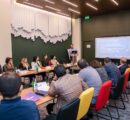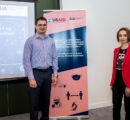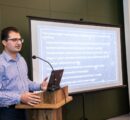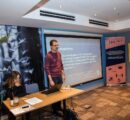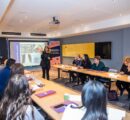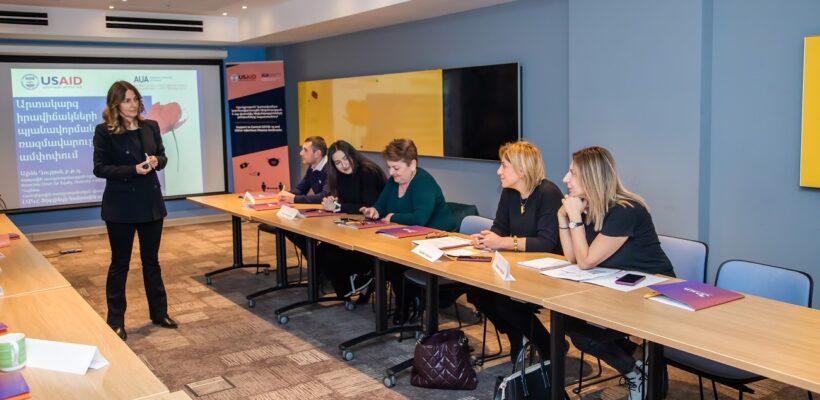
Turpanjian College of Health Sciences Supports Armenian Communities in Strengthening Emergency Preparedness and Response
3 min readYEREVAN, Armenia — With funding from USAID, the American University of Armenia (AUA) and Ministry of Health of the Republic of Armenia are jointly implementing the “Support to Control COVID-19 and Other Infectious Disease Outbreaks” project. This project aims to strengthen Armenia’s national and local capacity to control COVID-19 and other infectious disease outbreaks and public health emergencies.
As part of the project scope, AUA’s Turpanjian College of Health Sciences (CHS) held a stakeholder meeting with community leaders on May 25, during which the CHS team presented findings from a study assessing the impact of COVID-19 on the communities. Representatives of municipalities from 17 consolidated communities of Armenia participated in this event.
The study revealed multiple issues that community municipalities faced during the pandemic, including out-of-date emergency preparedness plans, lack of training in emergency procedures among municipality staff and community members, and exacerbated inequality of access to education and healthcare during lockdowns. Moreover, aid packages provided by the government were not distributed properly to reach those who needed it most.
In response to the findings, meeting participants suggested introducing legal reforms to clearly define roles and encourage collaboration among the various branches of government and municipalities. Additionally, emergency preparedness plans would require revision or the development of a new framework to include periodic drills for community members.
A separate meeting was held online with civil society organizations (CSO), during which the findings of the aforementioned study were similarly presented and discussed. CSO representatives shared their experiences with the pandemic and their work within communities. The ensuing discussion iterated similar needs.
Following the stakeholders’ meetings, the CHS team organized training sessions in October and November on “Roles and responsibilities of government agencies and communities in responding to emergencies” for the representatives of local community governance and ministries. Dr. Alina Dorian, associate dean for Public Health Practice and Equity, Diversity, and Inclusion at the UCLA Fielding School of Public Health, was invited to run the training and contribute to the project, given her strong international expertise in programming during complex emergencies and in developing deep and meaningful relationships with community partners. “Emergency preparedness is an ongoing process,” stated Dr. Dorian when greeting the participants. “It is a way of thinking and operating. It is continuous dialogue and relationship building. We work together to strengthen our community’s resilience so that we can better withstand the impacts of disasters. However, this type of on-going community planning and relationship building not only strengthens our emergency response, it also strengthens our everyday ability to respond to public health concerns and build a healthier and more resilient and just society.”
The training sessions involved 56 participants, including 39 representatives from communities and 17 from ministries. The training covered the following topics: consequences of natural and human-induced disasters, basic functions of public health during emergency situations, and National Incident Management System (NIMS) development and Incident Command System (ICS) fundamentals of operations. Based on a training survey, the vast majority of the participants expressed satisfaction and agreement that the topics were highly informative and important. Moreover, they stated that the training was well organized and met expectations and needs.
CHS continues its efforts to support and build capacity within local communities by sub-granting three CSOs to support the Areni, Amasia, Chambarak, and Berd consolidated communities. This includes conducting needs assessment, preparing emergency plans, establishing emergency response teams, and conducting training and awareness raising campaigns.
The AUA Turpanjian College of Health Sciences works actively to improve population health and health services in Armenia and the region through interdisciplinary education and development of health professionals to be leaders in public health, nursing, health services research and evaluation, and health care delivery and management.


